#cornell university
Text
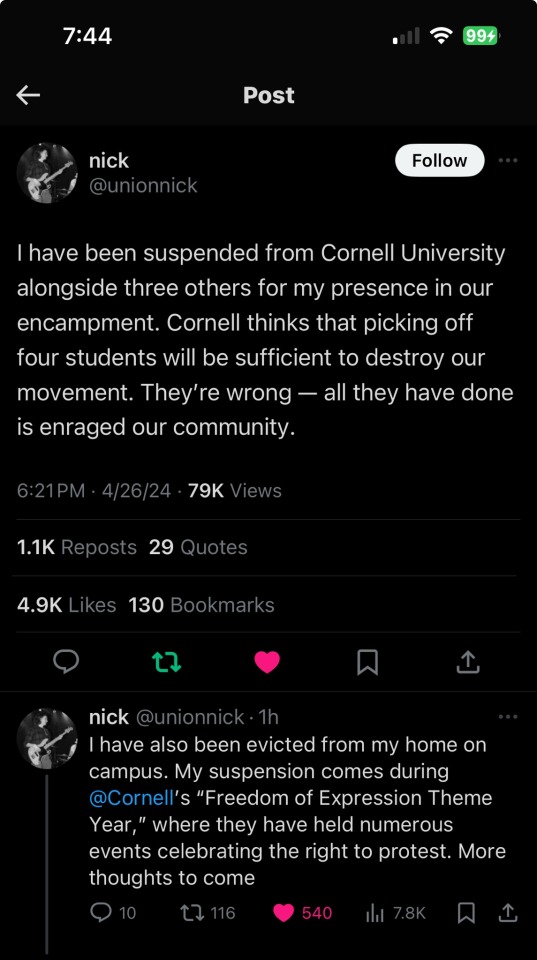
LESS THAN TWO HOURS AGO: four cornell students have been suspended (and at least the one reporting was evicted, unknown about the others) for their involvement with their campus's gaza solidarity encampment. during a school year centering freedom of expression no less!
#free palestine#end aid to israel#current events#palestine genocide#let gaza live#west bank under attack#save palestine#bds movement#campus protests#end the genocide#end the occupation#cornell university#the coalition for mutual liberation#students for justice in palestine#gaza solidarity encampment#boycott divest sanction#from the river to the sea#free palestine in our lifetime#no one is free until we are all free
613 notes
·
View notes
Text
Call it PRO -PALESTINE, PRO- LIFE OR ANTI WAR PROTESTS ,this my friend's is the era of the unstoppable Generation of resistance, #genz Just globalised the Intifada.Bidens and Netanyahu worse nightmare just went on overdrive.
#freepalestine #Stopisrael #gazagenocide #rafahmassacre #hamdsofrafah #gaza #palestine #Jerusalem #ceasefirenow #Iran #yemen #IDFterrorists #icj #globalstrikeforpalestine #globalintifida #revolution #genz #gotthis
instagram
#palestine#voiceforgaza#freepalestine#israel#israeli#palestinian#gaza#humanity#jerusalem#wakeupworld#usa#university#columbia university#pro palestine protest#happening now#yale university#EmoryUniversity#atlanta#university of southern california#university of texas#cornell university#princeton university#george washington#americans#awakened#gen z#unstoppable#globalintifida#revolution#gaza genocide
28 notes
·
View notes
Text
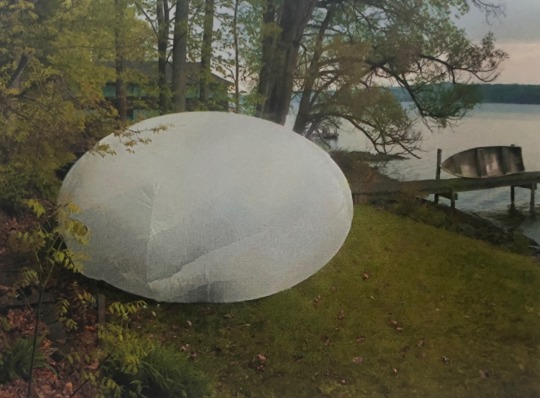
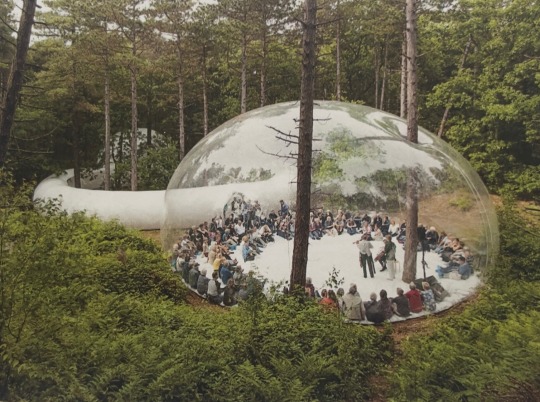
top - Cornell University: Jello Pavilion (2015) bottom - Plastique Fantastique: Loud Shadows (2017)
#Cornell University#Jello Pavilion#Plastique Fantastique#Loud Shadows#art#transparent#inflatable#bubble#forest#sculpture#2015#2017
828 notes
·
View notes
Text




Soooo... get this: the squids you're looking at right now ARE MADE OF GLASS! They were created by the renowned 19th-century glass artists Leopold and Rudolf Blaschka (father and son!), and you can find 251 images of these incredible pieces on the Cornell Collection of Blaschka Invertebrate Models on JSTOR, open and free to everyone.
#glasswork#glass models#blaschka#cornell university#squid squad#squid party#marine biology#anatomical model#squids art#squids#marine life#sea creatures#ocean creatures#squid games#squid#squid squid squid#research#jstor
722 notes
·
View notes
Text
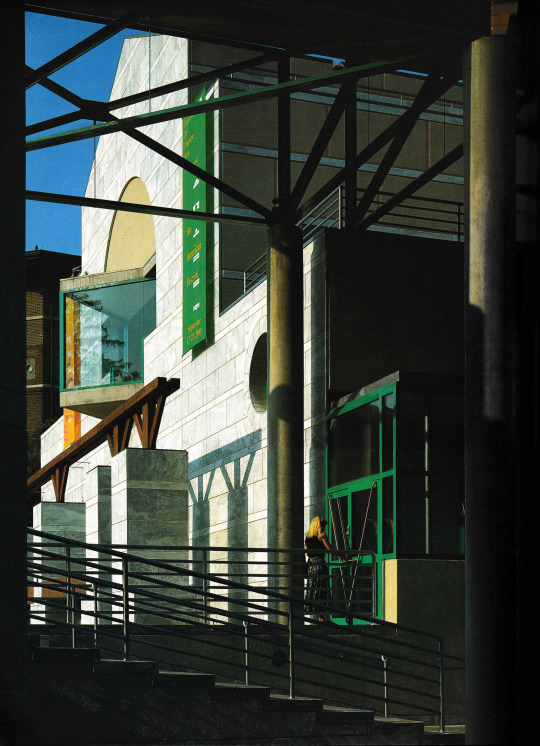


Performíng Arts Centre, Cornell University, lthaca, New York, 1983 - 1988. By James Stirling and Michael Wilford.
Scan
145 notes
·
View notes
Text
Jessica Costescu
A Cornell University instructor who once said Israelis should "rot in the deepest darkest pits of hell" canceled her first class of the semester in solidarity with a "Global Strike for Palestine," an email obtained by the Washington Free Beacon shows.
Alyiah Gonzales, a Ph.D. student at Cornell who teaches an English class on "race, writing, and power," emailed her students Monday to say she was "canceling class in solidarity with collective calls for a Global Strike for Palestine," according to a screenshot of the message. Gonzales in her email said she "mourn[s] the fact that all universities in Gaza have been destroyed or demolished by Israeli military forces." In lieu of class, she asked her students to write an essay on "the relationship between writing, power, and systems of oppression."

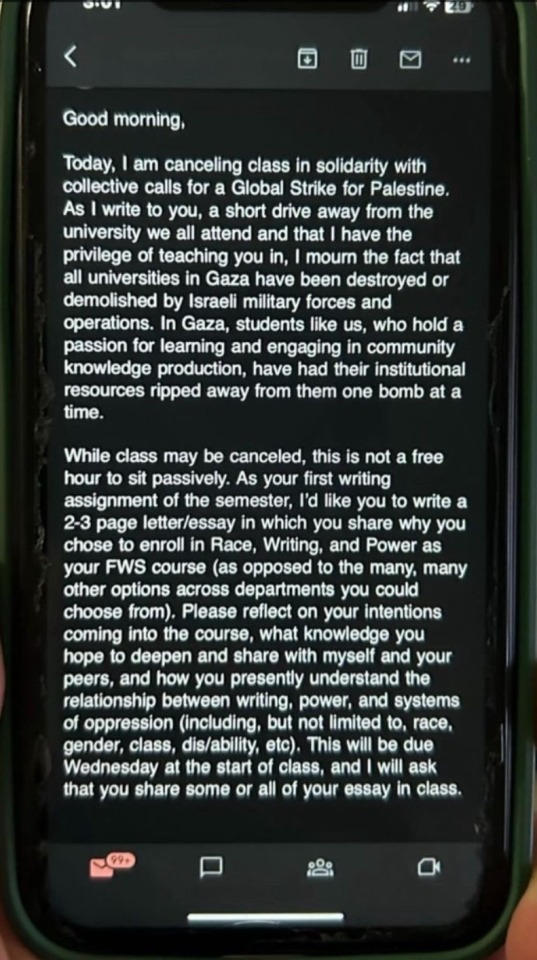
Gonzales's message comes as Cornell and other Ivy League institutions grapple with a federal investigation into anti-Semitic incidents on campus. In late October, a Cornell junior was arrested and charged with posting anti-Semitic threats online—in one message, the student allegedly said he would "bring an assault rifle to campus and shoot all you pig Jews." Cornell history professor Russell Rickford, meanwhile, praised Hamas's Oct. 7 attack on Israel during a campus rally, calling it "exhilarating" and "energizing."
52 notes
·
View notes
Text
Cornell University researchers have identified a new way to harness the antioxidant and antibacterial properties of a botanical compound to make nanofiber-coated cotton bandages that fight infection and help wounds heal more quickly.
The findings are especially important given the increasing prevalence of multidrug-resistant bacteria.
Cotton gauze is one of the most common wound dressings; it's inexpensive, readily available, comfortable and biocompatible. However, it doesn't promote healing or fight infection.
"Cotton alone cannot provide an answer for these complications -- it needs to be biofunctionalized," said lead author Mohsen Alishahi, a doctoral student in fiber science who works in the NanoFibers and NanoTextiles (NanoFibTex) Laboratory.
Read more.
22 notes
·
View notes
Text
The antisemitic threats happening in Cornell and greater Ithaca right now are completely unacceptable and cannot come to be seen as the new normal. Most Ithacan Jews have absolutely nothing to do with Israel and even if they did, attacking their jewishness is cowardly, xenophobic, and inherently wrong. You are not helping people if you are using antisemitism in your efforts against Israeli genocide of Palestinians. You are hurting people and you need to stop right now.
Ithacan Jews do not deserve what is happening to them right now. I stand with them against this scary threat to their community.
28 notes
·
View notes
Text
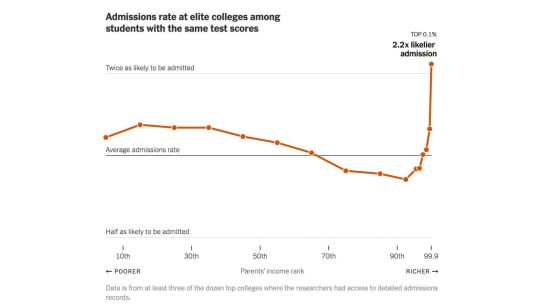
Chart: Courtesy of The New York Times
Children from ultra-wealthy families are more than twice as likely to gain admission to Ivy League schools compared to others with comparable test scores, finds a widely shared new working paper from a group of Harvard economists who study inequality.
Why It Matters: Even as the U.S. Supreme Court just eliminated racial preference in college admissions, the data show another kind of bias — that is, toward the very wealthiest applicants (who are disproportionately white).
• "In effect, the study shows, these policies amounted to affirmative action for the children of the 1%, whose parents earn more than $611,000 a year," per the New York Times report on the paper.
Between The Lines: The schools examined — the eight Ivies plus Stanford, Duke, M.I.T. and the University of Chicago — graduate a disproportionate share of the country's business and political leaders.
• 12% of Fortune 500 CEOs went to an Ivy, as did a quarter of U.S. Senators and 13% of the top 0.1% of earners, notes the NYT.
#us politics#news#Axios#the new york times#affirmative action#ivy league schools#racial preference in college admissions#us supreme court#scotus#students for fair admissions v. harvard#yale university#cornell university#harvard university#columbia university#princeton university#university of pennsylvania#dartmouth college#brown university#stanford university#duke university#university of chicago#Massachusetts Institute of Technology#classism#class warfare#2023#education system#education reform
30 notes
·
View notes
Text
Person arrested in connection with antisemitic threats at Cornell
BY HANNAH GILLOTT
A person has been arrested in upstate New York in connection with a potential hate crime at Cornell University.
New York Governor Kathy Hochul confirmed that a suspect is currently in custody, affirming that she is "committed to combatting hate and bias wherever it rears its ugly head".
The FBI were notified of a potential hate crime at Cornell University over the weekend after a series of “horrendous” antisemitic threats had been made against the school’s Jewish community in online posts, according to the college’s president, Martha Pollack.
Messages sent included threats to shoot Jewish students, and posts encouraging others to harm Jews. Authorities response to the Centre for Jewish Life on campus – which students were warned to avoid “out of an abundance of caution”.
Rabbi Silberstein, from Cornell Chabad, told the Jewish Chronicle: “These antisemitic posts were designed to sow panic and hysteria, which they, unfortunately, succeeded at generating. The fact is that by showing panic and fear we play into their schemes”. He said that although “the administration should respond to this with the fullest seriousness… the rest of us should take it for what it is - a cowardly threat and nothing more”.
This was not the first instance of antisemitism at Cornell, whose campus was recently defaced with graffiti reading “Israel is Fascist”. One Jewish student told CNN that such incidents are “really, deeply troubling and upsetting”
Antisemitic incidents in the US increased by nearly 400% in the days after the attacks by Hamas, according to the Anti-Defamation League, with universities a hotspot.
16 notes
·
View notes
Text
By: Susan Kelley
Published: May 2, 2018
Colleges and universities across the country are struggling with the question of who decides what is acceptable speech on campus. When does a controversial topic become hate speech? When should it be allowed as free speech?
Two Cornell researchers say psychological science’s extensive study of bias offers an important lens through which to view these conflicts, as we strive to understand and reduce them.
There is no alternative to free speech, say co-authors Stephen Ceci and Wendy Williams in “Who Decides What Is Acceptable Speech on Campus? Why Restricting Free Speech Is Not the Answer.” Their analysis appeared May 2 in Perspectives in Psychological Science as the lead article in the issue.
“There is no alternative to free speech, because every controversial topic has a substantial group of people who view it as hate speech,” said Ceci, the Helen L. Carr Professor of Developmental Psychology. “If we define unacceptable speech in terms of topics students say should be banned because they make them feel marginalized or uncomfortable, then we remove all controversial topics from consideration.”
Added Williams, professor of human development: “Feeling discomfort and angst at hearing words is not a legal reason to shut down other people’s rights to say those things.”
Since the 1950s, psychological science has demonstrated that many types of bias can prevent opposing sides from accepting the validity of each other’s arguments, the authors say.
Selective perception makes opponents on an issue literally see things differently. In 1954, researchers showed a film of a 1951 football game – Princeton versus Dartmouth, well-known for its competitive, rough play – to two groups: one of Princeton fans and the other of Dartmouth boosters. Each team’s supporters saw the majority of flagrant violations as having been committed by opposing players.
For people with selective bias, “it’s not just that they interpret their perceptions differently; they actually see different things,” Ceci said.
In “myside” bias, people look for evidence that supports their opinions and ignore or downgrade evidence that contradicts them. “Blind-spot bias comes from deep identification with a cause. We believe we are especially enlightened, while our opponents’ affiliation with the opposite side leads them to be biased,” Ceci said. Similarly, naïve realism makes people feel their views are grounded in reality but their opponents’ are not.
These and many other biases explain why a sizable percentage of students favor banning nearly every controversial topic, the authors said.
For example, a Cato Institute survey of 3,000 Americans with university experience found:
40 percent would ban a speaker who says men on average are better than women at math;
51 percent would ban claims that all white people are racist;
49 percent would ban statements that Christians are backward and brainwashed;
49 percent would ban speech that criticizes police;
41 percent would ban speakers who say undocumented immigrants should be deported;
74 percent said universities should cancel speakers if students threaten violent protest;
19 percent said violence is justified to stifle speakers who might make others uncomfortable;
and 51 percent said it was OK to prevent others from hearing a speaker.
“In such a climate, the heckler’s veto reigns supreme and any expression that is offensive to any subgroup on campus would be banned,” Williams said.
College experiences should involve challenging our beliefs, even when those experiences go beyond our comfort level, and no campus group has the right to determine for the entire community what can be discussed, the authors said.
Universities can take several steps to help students avoid the biases that prevent them from valuing other points of view and to reduce extremist views and confrontations, they said.
Just as colleges require that freshmen understand codes of conduct for sexual harassment, plagiarism and intoxication, they could require freshmen to understand the differences between free speech and hate speech, between First Amendment protections and speech codes, and the meaning of “evidence.”
Role-playing exercises could be woven into controversial seminars in which supporters of each side are asked to switch sides. And universities could organize civil debates on controversial topics.
Students should be made to understand they are entering a place that believes deeply in the importance of dialogue and free speech, Ceci said.
“Free speech isn’t just for opinions that we all share. That kind of speech doesn’t need protecting,” he said. “It’s for expressions that can be vile and hateful and disgusting. That has to be part of the cultural understanding.”
#Susan Kelley#Cornell University#free speech#freedom of speech#academic freedom#academic integrity#censorship#speech codes#hate speech#religion is a mental illness
9 notes
·
View notes
Text

Happy Cornell Day to all who celebrate
#cornell university#cornell#5/8/77#grateful dead#jam band#jam bands#jerry garcia#the simpsons#ned flanders#reverend lovejoy
42 notes
·
View notes
Text
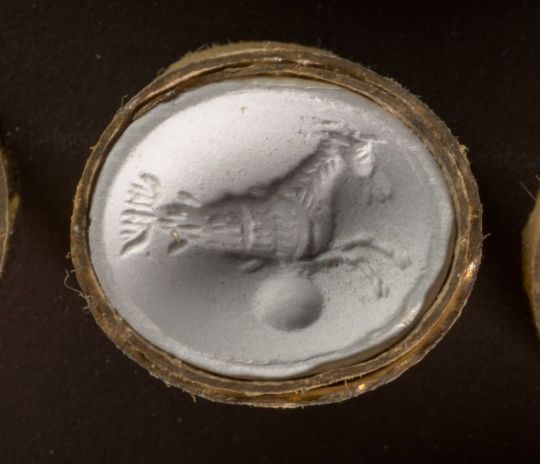
"Capricorn on a Solar Disk." 19th Century.
From Cornell's Gem Impressions Collection, free and open to all on JSTOR.
#would it surprise you to hear that our current tumblr mod is a capricorn? discuss.#suchhh a lovely collection#jstor#research#open access#cornell university#art#archives#sculpture#mineral#astrology
149 notes
·
View notes
Text
Lorenzo Langstroth unvarnished

Lorenzo Langstroth, 1890. From Langstroth on the hive & honey bee, rev. by Dadant. 1892.
December 25th, Christmas Day, is a day for sharing and giving. It also happens to be the birthday of a man known as the father of American beekeeping: Lorenzo Langstroth, born Philadelphia, Pennsylvania in 1810. With both happy occasions in mind, Mann Library is pleased to announce a resource that we’re pretty sure students of beekeeping and its history will find a wonderful gift: a fully digitized, searchable copy of Langstroth’s handwritten personal journal. Where a researcher would have once had to make an in-person trip to our special collections reading room to attempt a deciphering of Langstroth’s (infamously difficult to read) handwriting, the journal is now freely available (and actually readable!) as both a digitized version of the original work and in a transcribed form as part of the online Biodiversity Heritage Library.
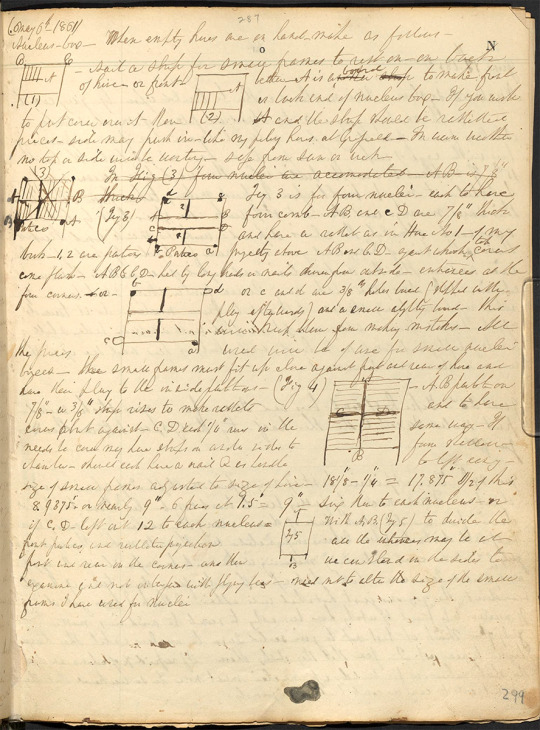
Page from "Journal on matters relating to bees, etc.," unpublished manuscript, Lorenzo Langstroth 1852-1895. in the special collections of Albert R. Mann Library, Cornell University.
For those not yet fully in the know, Lorenzo Langstroth looms large in American beekeeping history thanks to discoveries and inventions he made as a self-taught apiarist, innovations which essentially revolutionized the 19th century practice of beekeeping in North America and facilitated its development into the profitable industry of today. His guide on beekeeping, The Hive and the Honeybee, was first published in 1853 and remains in print even today. Langstroth’s story is also poignantly notable for a reason that you don’t have to a be a beekeeper to appreciate deeply: his struggles with debilitating depression, which stymied many of his professional endeavors. While working intermittently as a pastor and teacher when his mental health allowed, Langstroth found constant, life-affirming inspiration in the bee world he observed closely through the prism of the hives he kept for most of his adult life.
The history of beekeeping stretches back to prehistoric times, but when Langstroth patented his movable frame beehive in 1852 it created a worldwide revolution in the practice of keeping bees. On this page of his journal, we see the exact moment—the “aha” moment—that Langstroth landed on his brilliant insight: the significance of applying the concept of "beespace" to design hives that allow easier harvesting of honey than possible in earlier hive structures. The rest, as they say, is history.
The journal Langstroth kept is a treasure for several reasons. It provides fascinating insight into pivotal moments of beekeeping’s technological history. It is, as well, an intimate view of resilience in face of sometimes devastating mental health challenges. And last but really not least, in the comments and pet peeves that Langstroth also recorded in his ongoing notes-to-self, his off-the-record writing offers a more mundane but no less instructive tour through the day-to-day concerns—from keeping bee hives productive to the vexing challenges of protecting trade secrets and securing patents for promising new discoveries in a timely way—that would have been top-of-mind for any aspiring agricultural entrepreneur of the 19th century.
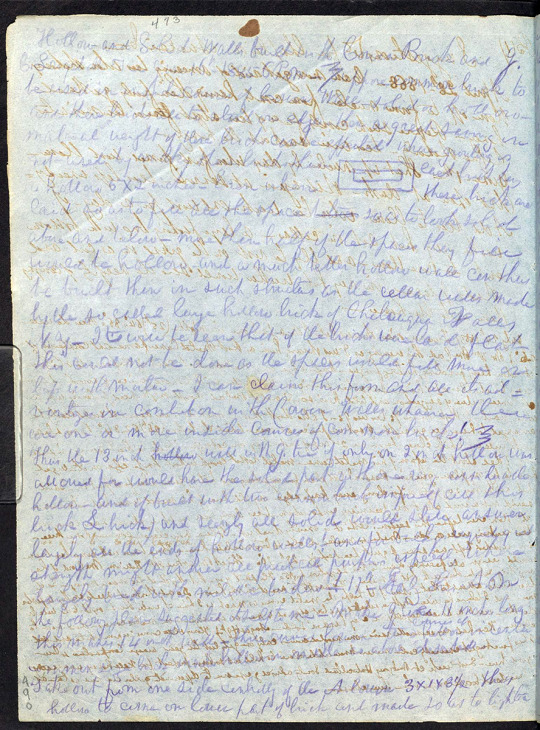
Page from "Journal on matters relating to bees, etc.," unpublished manuscript, Lorenzo Langstroth 1852-1895. in the special collections of Albert R. Mann Library, Cornell University.
The online availability of Langstroth’s journal in both its handwritten and transcribed form has been a work very long in the making. When early 20th century entomologist Everett Franklin Phillipps joined the Cornell faculty 1924, he made it his mission to establish one of the world’s most important collections of beekeeping materials—now known as the E. F. Phillips Collection at Mann Library. Recognizing the importance of one of this collections’ gems—the Langstroth journal—for the beekeeping field, Phillips began the painstaking process of transcribing 600 pages of its cramped, highly slanted script—rendered even more illegible by the frequent ink bleed-through from other pages—into easily readable typescript. The project remained unfinished at the time of Phillips passing in 1951, and others took up the work intermittently over the following decades. But it wasn’t until the epic pandemic-era national lockdown of 2020 that intrepid collections specialist Betsy Elswit finally found herself with the time needed to finish transcribing of the journal's final 200 pages. Thanks to this heroic work, a browse through the work on the Biodiversity Diversity Heritage Library today provides a look at Langstroth’s original writing with a side-by-side view of transcribed, machine-readable text. Thank you Betsy! And thank you, Reverend Langstroth, for persevering through the inspirational highs and deep lows of life to impact the practice of beekeeping so profoundly, and to leave us such a rich record of such remarkable scientific observation and personal achievement.
And with that, we leave you with our best wishes for a good, hope-filled winter holiday season!
#Langstroth#beekeeping#beekeeper#apiculture#mann library#cornell university#rare books#vintage book#archives#mental health#agricultural history#special collections#bees#honey#apiary#honey bees
11 notes
·
View notes
Text
By Alyssa Guzman
A Cornell professor who said he was “exhilarated” by the Hamas attacks on Israel has apologized for his incendiary comments, admitting his choice of words was “reprehensible.”
Russel Rickford, an associate professor of history, addressed the pro-Hamas statements he made at an off-campus protest over the weekend in a statement to the school’s paper, the Cornell Daily Sun.
“I apologize for the horrible choice of words that I used in a portion of a speech that was intended to stress grassroots African American, Jewish and Palestinian traditions of resistance to oppression,” Rickford wrote Wednesday.
“I recognize that some of the language I used was reprehensible and did not reflect my values.”
The educator — who “specializes in African-American political culture,” according to his biography — apologized to students for his “reckless remarks” and said he “unequivocally opposes and denounces racism, anti-Semitism, Islamophobia, militarism, fundamentalism, and all systems that dehumanize, divide, and oppress people.”
Lying POS. Yes, it did reflect his values. But for some reason, Cornell is taking his genocidal, Jew-hating statements seriously. So now he feels the need to backtrack.
“The university is taking this incident seriously and is currently reviewing it consistent with our procedures,” the school said in a statement to The Post.
38 notes
·
View notes
Text
Cornell University scientists have characterized the genome of a metal-loving bacteria with an affinity for rare earth elements. The research paves the way towards replacing the harsh chemical processing of these elements with a benign practice called biosorption.
Rare earth elements power electric cars, wind turbines and smartphones. Today, retrieving these metals from raw ore requires processing with acids and solvents. But a new technology, envisioned by the scientists and powered by a microbe, could make processing rare earth elements cleaner and scalable -- helping provide a steady U.S. supply for clean energy infrastructure and defense applications.
Their research, "Genomic characterization of rare earth binding by Shewanella oneidensis," was published in Scientific Reports.
"The problem with the current methods of rare earth element purification is that they rely heavily on organic solvents and harsh chemicals," said senior author Buz Barstow, assistant professor of biological and environmental engineering. "These methods are costly and environmentally damaging. Here we have a green alternative that uses microbes to selectively adsorb and purify rare earth elements, eliminating the need for harmful chemicals. We're making the purification process greener."
Read more.
42 notes
·
View notes